- Home
- Stacia Deutsch
Sacagawea's Strength Page 3
Sacagawea's Strength Read online
Page 3
Captain Clark explained that François Labiche would translate English into French. Toussaint Charbonneau would convert the French words to Hidatsa. And Sacagawea would change the Hidatsa to Shoshone for the chief.
Then Captain Lewis began the meeting. “This land now belongs to the United States of America.”
“How much time do we have?” Zack whispered to Jacob as each person in the translation chain told the next one what Lewis had said. “This could take hours.”
Jacob leaned over and whispered, “We have one hour, eleven minutes. Plenty of time.”
For some reason, I didn’t understand when Sacagawea spoke in Shoshone or Hidatsa. I figured maybe the stones only worked when we talked to her directly. That was fine. The human translation chain worked so well, we didn’t need the stones to help us know what was going on.
Captain Lewis explained that the tribes were now governed by a great man in the far East named President Thomas Jefferson. He gave the Shoshone chief a small coin-size medal with a picture of Jefferson on one side and two hands shaking on the other. He called it a peace medal.
The chief rose and tied white shells in William Clark’s red hair. He also put some in Lewis’s gray-streaked hair. They looked like little pearls. When the chief sat again, he passed a peace pipe around.
Once the men had smoked the pipe, the trading began.
Sacagawea was staring at Chief Cameahwait again while William Clark explained that the usual price was one knife for one horse. He put his own knife down on the blanket so everyone could see it. Sacagawea didn’t look at the knife. I guess she’d seen one a thousand times. She just kept looking at the chief.
The chief picked up the knife and inspected it. Then he said, “My tribe is the poorest of the nations. We are constantly raided by other Indian tribes with guns. They get their weapons from the East. From trappers and other travelers. The Shoshone need guns for hunting and to protect ourselves.”
He paused for the translators to catch up, then said, “Five years ago, the Hidatsa Indians raided our tribe. They stole Shoshone horses. They even kidnapped many of our people. They took my sister away. Of my family, only my nephew and I survived.”
Suddenly Sacagawea began to weep. She leaped up from her place, a flood of Shoshone words coming from her mouth, and rushed over to the chief. He grasped her by the shoulders, looked clearly into her face, and broke into a mighty grin. Sacagawea then wrapped her blanket around his shoulders. Pressing her face into his neck, Sacagawea began to cry in loud, heartfelt sobs.
The Shoshone chief wrapped her into a hug and we knew right away that he was someone special. For a long time Chief Cameahwait held her close. Sacagawea cried and cried some more. Finally, she lifted her head and spoke to her husband, Charbonneau.
The translation went down the line until François Labiche announced that Sacagawea was the sister in Chief Cameahwait’s story. She had been kidnapped as a girl, and now, after all these years apart, Sacagawea was finally reunited with her brother!
My cheeks hurt from holding back my own happy tears.
Captain Lewis declared, “Because of the reunion between Sacagawea and her brother, Chief Cameahwait, we will forever call this place Camp Fortunate. We are very fortunate to have found Sacagawea’s brother, alive and well.”
Bo cupped his mouth with his hand and said, “That’s how most of the places Lewis and Clark visited got names. They named them after people on the trip or things that happened. It’s a bummer, but most of those names were changed later by explorers.”
When the trading finally ended, it was agreed that the Shoshone would receive a knife, a gun, and some bullets for each horse. In exchange, the explorers would get twenty-nine horses and a Shoshone guide to help them across the Rocky Mountains.
The Native Americans would also get clothing and extra food after they gave Lewis and Clark information about the mountains for this part of their map.
Everyone seemed happy that it was a fair trade.
Everyone, that is, except Bo.
“What’s up?” I asked Bo, who had an incredibly sad look on his face.
“The Shoshone agree to the trade now, because they want the guns. They have never seen the white people before. They are excited. But, truthfully, they have no idea what is going to happen in the near future.”
“What do you mean?” Jacob wondered.
“Well,” Bo explained, “Lewis and Clark thought that other U.S. government explorers would bring the promised guns and knives to the Shoshone. But that won’t happen. In fact, when the explorers and settlers come across America, the Shoshone and all Native Americans will be gathered up and sent to live in camps called Indian Reservations. They won’t be able to move around freely like they do now. They’ll be stuck with some of the worst land in America.”
“Really?” Zack asked. “Are you sure? The Shoshone don’t seem afraid of what will happen. They’re still talking happily about the trade.”
“I’m positive,” Bo told us. “Even in our time, there are still Reservations. Many Native Americans are very poor. And they have lost much of their special culture.” He sighed. “Truthfully, Lewis and Clark don’t know what is going to happen either. In a few years, Captain Lewis will become very sad when he realizes how unfairly the Native Americans are treated.”
Bo paused for a second, then added, “Did I mention that the settlers are also going to kill most of the buffalo, cut down many of the forests, build railroads, and create big cities all over the West? Some people think that cities are really good. Other people think cities destroy the land and animals.”
I wasn’t sure what I thought about building cities. I mean, I like going to the mall, more than I like camping. Then again, I know trees and fresh air are healthy, and it was beautiful around here. . . .
Hmmm. I’d have to think about cities versus nature when I got back home. Right now, I was more worried about what was going to happen to the Native Americans.
“Should we warn Chief Cameahwait?” I asked Bo.
We both looked over at the Shoshone chief. He seemed so pleased with the details of the trade. He was happy to have found his sister. We knew it wasn’t our job to change history. Just to keep it on track. Besides, Chief Cameahwait seemed so excited about the trade, he wouldn’t have believed us anyway.
Calling everyone to attention, Captain Lewis declared, “Now we must talk about the map.”
We all went outside the sail-shade. There, by the side of the river, Captain Lewis asked one of his men to get their mapping equipment.
Bo’s face lit up when the man returned with a two-pole chain and compass.
Zack rolled his eyes and looked bored as William Clark got out his personal journal and began to make notations. They were measuring distances—from Camp Fortunate to the river. The river to the tall reeds nearby. Reeds to rocks. And once those numbers were collected, Captain Clark asked Chief Cameahwait to draw a picture of the mountains using a stick in the dirt.
Chief Cameahwait built the mountain range out of sand. He was just about to draw a trail with his stick when two men on horseback came riding into camp. They were wearing U.S. Army jackets, but didn’t have nearly as many medals and stripes as either Lewis or Clark.
“We borrowed some horses from the tribe and went off to kill a deer for you as a gift for your people,” one of the riders announced. “We shot one just over that ridge.” The translators scrambled to tell Chief Cameahwait what the soldier was saying.
Chief Cameahwait immediately threw down his drawing stick. “It is time to eat,” he declared. “We will make the map later.”
“But we need it now,” Clark insisted.
Lewis added, “It is of great importance to us.”
“Food first. Map later.” Chief Cameahwait walked away.
Dreams
“Wait!” William Clark called after Chief Cameahwait. “The map!” But it was no use. The chain of translation had been broken. Even Sacagawea and her husband had hurried
after the others toward the dead deer.
There were about sixty Native Americans plus the thirty-three men in the Corps, all rushing toward the ridge. We followed to see what was going to happen.
The Native Americans sped past on horseback. The members of the Corps had to walk, since they didn’t have horses. We walked too. By the time we arrived, the deer had been torn limb from limb.
We stood with Lewis and Clark’s men and watched as the Native Americans sat on the ground hunched over, eating the deer raw.
I felt sick. “Couldn’t they have waited for the barbecue?” I asked the boys, turning my head away. I couldn’t watch.
“They’re starving,” Bo responded. I refused to peek, shutting my eyes tightly, so Bo described the scene. “The Shoshone are eating like they haven’t had meat in a very long time. I remember reading that the Shoshone were so poor, there were times when they ate nothing but berries for months.”
“I hate berries,” Zack commented as he watched one man eat. Zack told me there was fresh blood dripping down the man’s chin. He described how the man wiped his face on his arm and kept eating.
“Eeww,” I said, holding my stomach. I took a quick glance at Jacob. He was a nice bright shade of green.
“Starting today, I’m a vegetarian,” he declared.
When the deer meat was gone, two Native-American men lent two Corps soldiers their horses. The soldiers took their rifles and rode off to hunt another deer.
The people in Lewis and Clark’s Corps of Discovery weren’t starving like the Native Americans. They hunted and fished, but they also had brought dried food and other supplies with them. Today’s lunch was dried buffalo meat and some roots that Sacagawea had dug up herself.
While everyone ate, Zack, Jacob, Bo, and I decided we’d better go find Sacagawea. We only had fifty-two minutes left on the computer and we hadn’t talked to her at all. Except for that tiny conversation when she handed me the clothes.
“Everything seems fine,” Zack remarked. “I haven’t heard anything about Sacagawea quitting.” He scratched at his neck. “Maybe after we talk to her, we can change back to our wet clothes and zoom home. These army uniforms itch.”
Sacagawea was over by the river. The Corps of Discovery had brought the rest of their gear and stashed it in big piles by the river’s edge.
She was leaning over an open crate, taking items and stuffing them into a small carrying bag. Sacagawea was singing a Native-American chant while she worked. I don’t know why, but even though I had the translator stone in my hand, I didn’t understand her song.
Crossing over to her, I said, “You must be very happy to have found your brother again.”
Sacagawea stopped packing, but didn’t stop chanting. She looked up at me and shook her head. It was obvious that she didn’t know what I was saying.
I opened my hand, revealing my translator stone inside.
I had an idea. Reaching out, I took her hand and shared my translator stone by setting it in her palm.
“Are you happy to find your brother?” I asked again.
She looked down at the stone in her hand, turning it round and round, examining it.
“It doesn’t work,” I told the boys, taking the stone back from her.
The stone I held had the antelope carved on it.
“Trade me,” I said to Zack. “Maybe the antelope is broken.”
Zack’s stone had the raccoon picture engraved on it. The very second I held the stone, the words to Sacagawea’s native chant became clear in my head. As clear as if she were singing in English.
“It works,” I exclaimed. “We were holding the wrong stones.” I pulled the bear stone out of my pocket. “Mine is the raccoon, but who gets which one of the others?”
We all stood together, holding the stones before us in our open palms.
Sacagawea came and peered over my shoulder, interested in what we were doing. The boys were switching stones again and again, trying to match up with the right ones.
Sacagawea shook her head at them and held out her hand, silently requesting the boys give her all the stones. I kept mine, so I was the only one who understood her words.
“The spirits of animals stand beside each of you. You”—she pointed at me—“are like the raccoon, curious and full of wonder.”
Turning to Jacob, she handed him the antelope stone. Suddenly, Jacob’s eyes brightened and I knew he understood what Sacagawea was saying. “Your spirit is the antelope, the one who takes action.”
She handed Zack his stone. “There is a coyote beside you. A cunning trickster. The master of humor. Even though you have a strong survival instinct, you howl at the moon. Full of worry.” Zack proudly smiled because the description fit perfectly.
“And you”—she gave a blue stone to Bo—“you stand with the mountain lion. Swift with wisdom and balanced in leadership.”
I wondered how she was able to figure us out so fast. Were there really animal spirits hovering around us? I felt a cold chill travel down my spine and I remembered the sounds I had heard just before time-traveling.
“The raccoon, antelope, coyote, and mountain lion are animal spirits who protect and guide you.” Sacagawea looked down at the last stone in her hand and asked, “But who is the bear?”
In the flash of an instant, I knew the answer to Sacagawea’s question. “You are the bear,” I said confidently. Sacagawea stared at me as if I were nutty, and yet she definitely understood what I had said. The bear stone had worked. It had translated for her. So I asked her to explain what the spirit of the bear meant.
“The bear spirit walks with a person who has many dreams and the brave strength to follow those desires.”
“Yep,” I exclaimed. “The bear stone is yours—for sure.” I told her my name and introduced the boys.
Now that we understood one another, it was time for business. “Sacagawea,” Jacob asked, “since you are the bear, what is your dream?”
Sacagawea looked down at the stone in her hand and said, “I have no dreams of my own.” She didn’t sound sad. She was just stating a fact. “I do not walk with the spirit of the bear. There is no animal spirit beside me.”
She looked up at the sound of her name. “My brother is calling. I must finish packing my things,” she said, handing me back the bear stone.
“Where are you going?” I asked, refusing to take the translator, practically forcing her to keep the stone.
“I am running away. I have decided to follow Chief Cameahwait and the Shoshone tribe to the buffalo hunting grounds. The buffalo are on the move—we must leave Camp Fortunate immediately.” Sacagawea sighed.
“What about Lewis and Clark?” Jacob sounded panicked. “You have to help them on the rest of their journey!”
“Lewis and Clark do not need me,” she replied, head hung low. “The Corps of Discovery will find their way.”
“You can’t just pack up and go!” I cried out. “You’re married! What about your husband?” If she wouldn’t stay to help Lewis and Clark, maybe she’d stay with Charbonneau.
“He’ll be fine without me too.” Sacagawea shrugged, then looked me straight in the eye and said, “I have no reason to stay. You cannot stop me. I quit.”
And with those words, she handed me the bear stone and refused to take it again.
Buffalo
“Maybe we should jump back to school now,” Zack suggested. “Sacagawea just quit. She says she has no dream. And this stupid uniform is giving me a rash.” Zack scratched at his arm.
“Maybe you could stop scratching for a second and we can help Sacagawea find her dream,” Jacob replied. “If she had a dream of her own, maybe she wouldn’t quit.”
Mr. C was right. This adventure was way more difficult than any of our others. Usually, the people we visited were quitting their dreams. How could we help Sacagawea follow her dream if she didn’t have one? And what if her dream was something she wanted to do without Lewis and Clark?
“I don’t know how you get
someone a dream,” I said. “Isn’t a dream something people think up on their own? It’s what they really want and what they hope and—”
Suddenly, Bo interrupted. “Maps!” he said so loudly, I jumped in surprise. “How could I have forgotten it’s all about maps? I hate to say it,” he admitted, “but it kind of doesn’t matter if Sacagawea has her own dream. For history to stay on track, we need to convince her to stay and help Lewis and Clark finish their map.”
We all agreed to try. Still, in my heart, I hoped that while we were convincing Sacagawea to stay with the expedition, she’d also find a dream of her own.
I went over to Sacagawea and begged her to take the bear stone, saying, “Please, we can’t talk to you if you don’t hold the stone.” I had to repeat myself a few times before she finally took back the rock.
Bo looked at Sacagawea and said seriously, “Lewis and Clark wouldn’t have made it this far without you.” Sacagawea was just a teenager, not quite a real adult, but it was still tough for shy Bo to talk to her.
“Yes, they would have,” Sacagawea claimed. She was only half-listening, playing with the beads on her dress. “They don’t need me.”
“Yes, they do,” Bo insisted. I heard him mutter the word “maps” under his breath as he built up the courage to go on.
“A few months ago, some of the boats overturned on the river,” he reminded her. “It was kind of like what happened today, only the water was colder and deeper. Many of the men were too afraid to go into the rushing water, but you risked your life to help save the expedition’s mapping journals and supplies.”
I gave Bo a big thumbs-up. Sacagawea might not be convinced, but she’d stopped looking at her beads. She was definitely listening.
Bo continued: “Later, when you were so sick, everyone thought you’d die, Captain Lewis took care of you, giving you medicine until you got healthy.”
“See?” I said, helping Bo. “Lewis wouldn’t have spent so much time nursing you if you weren’t important.”

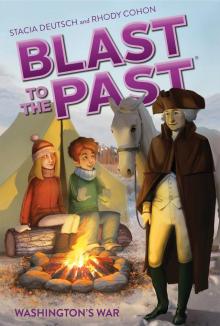 Washington’s War
Washington’s War The Friendship Code #1
The Friendship Code #1 Spirit Riding Free: PALs Forever
Spirit Riding Free: PALs Forever Ghostbusters Movie Novelization
Ghostbusters Movie Novelization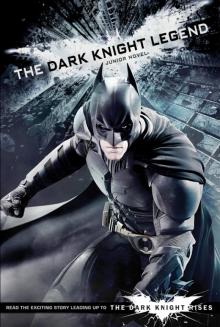 The Dark Knight Legend
The Dark Knight Legend Cinnamon Bun Besties
Cinnamon Bun Besties Spirit Riding Free: Abigail's Diary
Spirit Riding Free: Abigail's Diary Spirit Riding Free--Pru's Diary
Spirit Riding Free--Pru's Diary Diary of an Evil Queen
Diary of an Evil Queen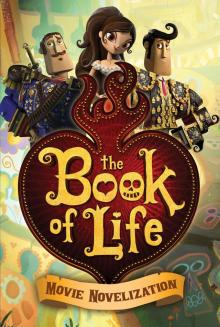 The Book of Life Movie Novelization
The Book of Life Movie Novelization Ben Franklin’s Fame
Ben Franklin’s Fame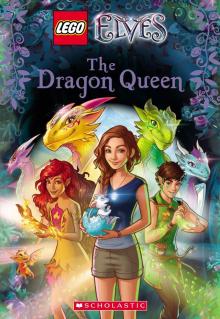 The Dragon Queen
The Dragon Queen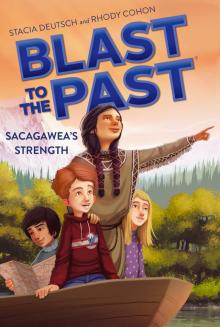 Sacagawea's Strength
Sacagawea's Strength Team BFF--Race to the Finish! #2
Team BFF--Race to the Finish! #2 Spirit Riding Free: Lucky's Diary
Spirit Riding Free: Lucky's Diary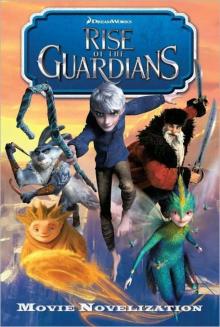 Rise of the Guardians Movie Novelization
Rise of the Guardians Movie Novelization Dragon Games
Dragon Games In the Stars
In the Stars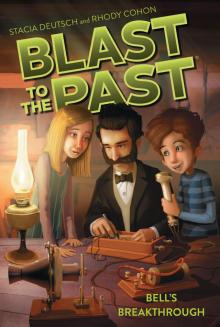 Bell’s Breakthrough
Bell’s Breakthrough